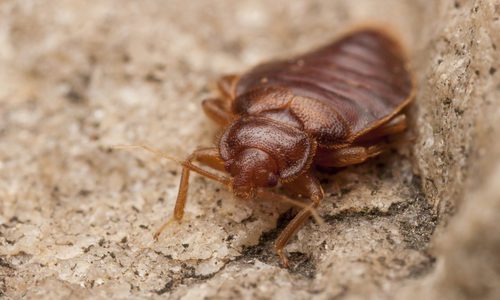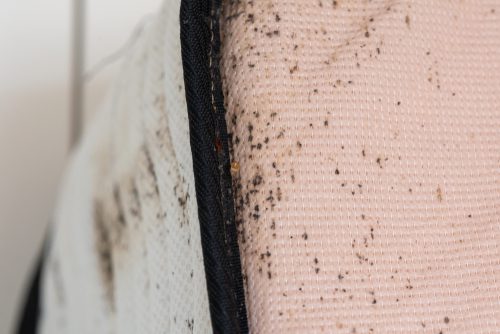
Why do I have bed bugs?
Bed bugs are consummate hitchhikers. You can pick them up just about anywhere and once they’re inside your home or business, they’ll start to establish nests. A common way bed bugs enter your home is by grabbing a ride in your luggage while you’re traveling, but they can also latch on at the office, gym, or even from a taxi ride. Regardless where they came from, once you discover them, you need fast and effective bed bug treatment to get rid of them.
How can I prevent bed bugs?
The best way to prevent a bed bug infestation in your home is by making sure they don’t hitch a ride on you in the first place. If you’re traveling, check your hotel room by lifting the sheets, looking under pillows, and checking cracks and crevices before settling in or opening your bag. Once you get home, run your clothes in a hot dryer for an hour to kill any potential bed bugs.
To keep bed bugs from reproducing in your home, always wash all linens on the highest temperature you can, avoid purchasing second hand furniture, and remove the sort clutter where they can hide.
How does Gregory Pest perform bed bug control?
To identify and remove bed bugs from your home or business, Gregory often uses bed bug-sniffing dogs. They work well to pinpoint infestations in multiple apartments, hotel rooms or large buildings. Their keen sense of smell allows our experts to find bed bugs and destroy them quickly and efficiently.
Gregory’s bed bug removal service uses heat to kill bed bugs. Our Thermal Remediation® Heat Treatment equipment is a self-contained system that utilizes space heaters and monitoring devices to achieve a safe and effective level of heat within the treated areas. The heat kills all stages of bed bugs: eggs, young, and adults.
How Gregory’s thermal solutions for bed bugs Work
- The entire treatment area is heated to 120° F. or higher. Once the heat in the treated area reaches the optimum temperature, it is maintained for 4 hours in order to ensure complete eradication of the infestation. The hot air is circulated using fans, and temperatures are monitored throughout the treatment area(s) during the process.
- An application of residual insecticides may be made into the cracks and crevices where any surviving Bed Bugs might have crawled. In most cases, this process eliminates all Bed Bugs within the treated area(s).
- After the treatment is complete, the Gregory Specialists will disassemble and remove the equipment and do a final inspection to make sure all Bed Bugs have been exterminated.
Thermal Remediation® and related logo is a trademark owned by TEMP-AIR, Inc. and is used by permission.
Call Gregory Pest Solutions for help with bed bug Thermal Remediation® treatment at 1-(866) 349-3752 or use our email form to contact us today.
What is a bed bug?
Bed bugs are parasitic insects best known for their love of feeding on blood (usually human) and making homes in warm, quiet, enclosed spaces like mattresses and bedding. They’re small, usually between 4 and 5 mm long, and are reddish-brown in color. Blood is all they eat, and they don’t need a lot of it to survive. That means that they’re able to hide away for long periods of time, only coming out of hiding during cool nighttime hours.
They’re slower to reproduce than comparable insects. A typical adult female lays one to three eggs per day, with each egg taking two months to produce an adult. Even with slow reproduction, because they’re good at hiding, it’s easy for bed bugs to increase their numbers.
Are bed bugs dangerous?
The biggest potential issue with bed bugs is bites. Blood is their primary food source and needed by females to produce their eggs. Common symptoms of bed bug bites include itching, welts, and swelling. Bed bugs are not known for transmitting diseases, though there is the chance of secondary infection that comes from scratching and picking at bites.
Long story short, bed bugs don’t pose an immediate danger but infestations can become messy and difficult to get rid of. Protect your home or business with expert bed bug control services.

Bed Bug FAQ
How do you get bed bugs?
Bed bugs spread by attaching to you or your belongings and traveling to your home or other locations. If you’ve spent time somewhere with a bed bug problem, chances are a few hitched a ride on your clothes or in your luggage and found a new home. They can also spread through used furniture and other second hand items that have been exposed.
Do bed bugs fly?
No. Bed bugs can crawl quickly but they don’t fly or jump. Carpet beetles are a small pest that is very similar to bed bugs and can fly. It’s easy to confuse the two.
How do you find bed bugs during the day?
Bed bugs prefer small quiet places during the day. Look along the seams of your mattress, behind your headboard, in cracks and crevices and under pillows. A bed bug sniffing dog can’t help locate pests in your home or business.
How do you know if you have bed bugs?
Waking up with bites on your hands, arms, feet and ankles is a good sign of bed bugs. Also look for dark and rust colored stains on your mattress or bedding.
Where can I find a bed bug exterminator?
We’d love to be your trusted provider for pest control. Bed bugs can be difficult to identify and eliminate but we’ve been doing it for over half a century. In that time, we’ve learned the best techniques to get rid of bed bugs and other pests from homes and businesses like yours.
Where can I get help with bed bugs?
Nobody wants a pest problem. Bed bugs aren’t welcome roommates, after all. Neither are any of the other insects, wildlife, and rodents we help remove from homes and businesses. If you live in any of the states listed below, Gregory Pest Solutions offers the pest and bed bug solutions you need to keep these unwanted visitors away.
Don’t let pests cause you problems. Instead, get in touch with Gregory Pest Solutions. You can schedule a service, give us a call, or request a quote below.
